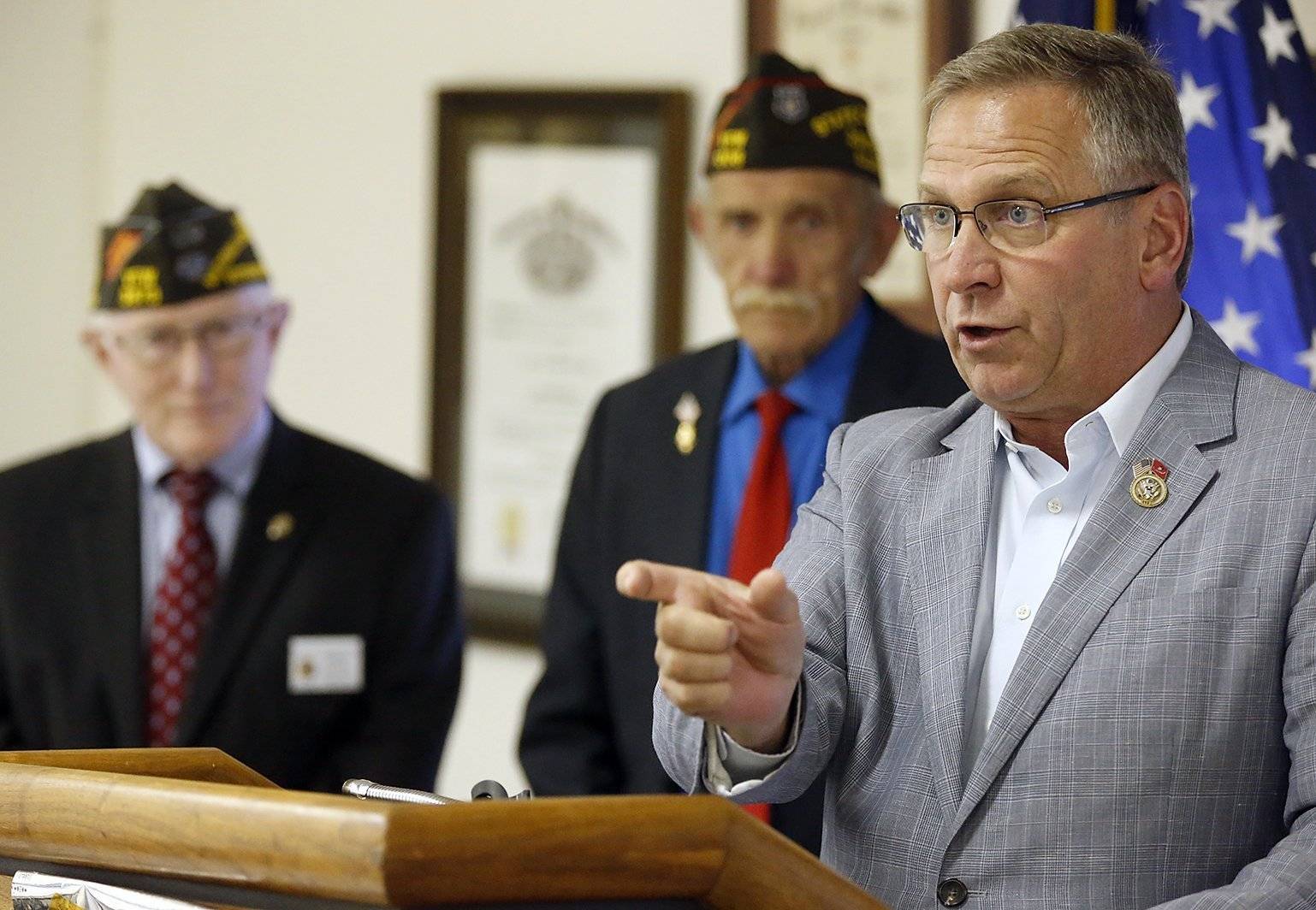
Lawmakers closing ranks on a bipartisan bill to fix VA’s troubled EHR rollout
House and Senate lawmakers are starting to close ranks on which of several EHR modernization bills has the best chance of making it through Congress.
House and Senate lawmakers from both parties agree the Department of Veterans Affairs’ rollout of a new Electronic Health Record is falling short of expectations.
Top Democrats and Republicans on the House and Senate VA committees introduced several EHR reform bills over the past few months.
But with the VA back at the bargaining table with EHR vendor Oracle-Cerner, seeking a tougher contract, lawmakers are starting to close ranks on which bill has the best chance of making it through Congress.
House VA Committee Ranking Member Mark Takano (D-Calif.) said he’s working with Chairman Mike Bost (R-Ill.) on a “long-term solution to the EHRM program,” and that they plan to introduce a bill in the House later this week that’s already got the support of Senate Democrats.
The EHR Program RESET Act would prevent the VA from proceeding with EHR go-lives at additional facilities, until performance data from the five current sites already using the system shows improvement.
The RESET ACT is led by Senate VA Committee Chairman Jon Tester (D-Mont.) and Sens. Patty Murray (D-Wash.) and Sherrod Brown (D-Ohio).
“We’ve had a lot of success working together on a bipartisan basis, and I look forward to continuing to work across the aisle to fix this problem,” Takano said.
Ranking Member of the House VA Committee’s Oversight and Investigations Subcommittee Frank Mrvan (D-Ill.) said he will cosponsor the RESET Act once it’s introduced in the House.
“This bill is an ideal platform for negotiating a long-term, bipartisan fix to the program,” Mrvan said, adding that the legislation addresses several of the issues outlined in the EHR Modernization Improvement Act, which is led by House Republicans.
VA executives told the oversight and investigations subcommittee they support elements of the reform bills that would hold the Oracle-Cerner EHR’s performance to a higher standard, but said the agency would need to see changes before fully backing any of the bills.
Phillip Christy, the deputy executive director of VA’s Office of Acquisition, Logistics and Construction, said the agency supports some parts of the EHR Modernization Improvement Act led by House Republicans.
Christy said in his prepared remarks that VA broadly supports legislation that would seek a higher standard for the EHR’s uptime, as well as ensure that current sites using the EHR meet certain performance metrics before new go-lives can proceed.
The VA, however, is suggesting modifications to the bill that would address its concerns.
“We believe the modifications would work towards facilitating the intent of the bill,“ Christy said.
Among the VA’s proposed technical changes to the bill, the agency is looking to modify language that would require the “completion of all improvements or modifications” to the Oracle-Cerner EHR that have already been contracted out, before the agency can resume additional go-lives.
Christy, in his written testimony, said the VA has many EHR improvements underway, some of which won’t be completed by the end of this year.
“Many of these improvements are important, but not essential, for a future go-live,” Christy wrote.
Leslie Sofocleous, the executive director of the VA’s EHR Modernization Integration Office, said “productive negotiations and conversations” are ongoing between VA and Oracle-Cerner over new terms for their EHR contract.
Sofocleous said those negotiations are focused on EHR’s level of performance, as well as the agency’s “ability to hold Oracle-Cerner accountable.”
“We do have backup strategies in place, and will be more than happy to provide updates as we move forward with negotiations,” she said.
Sofocleous said there are “additional operational metrics that we want to incorporate” to determine whether the VA will proceed with an EHR go-live decision as planned.
Sofocleous said the VA used that new decision framework when it postponed EHR go-lives planned in Ann Arbor, Michigan and Saginaw, Michigan.
“Those decisions are collaborative decisions. They’re not made in a vacuum,” she said.
The VA also supports the VA IT Modernization Improvement Act, led by top Democrats on the House VA Committee, as long as Congress attaches funding to the bill.
The legislation would require VA’s chief acquisition officer to contract out an independent verification and validation (IV&V) of several VA modernization efforts.
“VA anticipates an IV&V contract of this size would be extremely expensive. Appropriate and timely funding of this bill is critical,” Christy said.
The third-party auditor would oversee the rollout of VA’s Oracle-Cerner EHR, as well as its Veterans Benefits Management System, Financial Management Business Transformation and supply chain modernization efforts.
“From an acquisition and a VA perspective, this is a good thing for the VA and veterans. We’re going to start getting help with making sure the money that’s spent we’re getting the value from the money we’re spending on veterans,” Christy said.
Mrvan said the VA IT Modernization Improvement Act would ensure that the VA and taxpayers “get what they pay for.”
The Government Accountability Office recently recommended that the VA reinstitute plans to conduct an independent operational assessment of its EHR Modernization program.
Shelby Oakley, the director of contracting and national security acquisitions at GAO, said other major VA acquisition projects would benefit from the same kind of assessment.
“I definitely don’t think I can think of any program that would be considered under this bill that couldn’t benefit from additional quality information to support decision-making,” Oakley said.
The VA, however, opposes the Manage VA Act, which would require the VA to create an undersecretary for management position to oversee its IT and acquisition decisions.
Christy said the VA deputy secretary already fulfills this role as the agency’s chief operating officer.
Mrvan said the bill would create a VA executive position “that has the authority and weight to ensure that we don’t keep making the same mistakes over and over and over again.”
“Creating one management position is not going to fix every issue that VA has had with managing acquisitions, budget and IT across the department, but it’s a start,” Mrvan said.
The VA also opposes a bill that would terminate the EHR Modernization program.
“Modernizing VA’s EHR is critical for providing the best care for our veterans and facilitates advancements in the delivery of that care. We believe terminating the program would work against those goals,” Christy said.
The bill’s author, Technology Modernization Subcommittee Chairman Matt Rosendale (R-Mont.) said VA Secretary Denis McDonough made the right call to postpone several recent EHR go-lives.
However, he said the Oracle-Cerner EHR has created “unacceptable levels of productivity losses, patient safety risks and staff burnout,” and isn’t well-suited for the VA’s needs.
“While Secretary McDonough deserves credit for this decision, I think it’s unwise to delay the inevitable,” Rosendale said. “This system and this project have simply not worked out and or bleeding critical resources from the VA at astronomical rates.”
The Oracle-Cerner EHR, to date, has only gone live at five small and medium-sized VA medical facilities. A full rollout would include 171 VA medical facilities.
Rosendale said veterans receiving care at those five facility centers have complained about not receiving medication in the mail, or receiving the wrong medication, as well as delayed appointments with specialists and “generally increased wait times.”
VA clinicians at these, he added, have also left the agency “because of frustrations with the system.”
“Quite frankly, I feel sorry for the witnesses that are here trying to defend the demonstrably failed system,” Rosendale said.
Oakley pointed to an earlier GAO report that found the “overwhelming majority of users” are not satisfied with the Oracle-Cerner EHR.
However, she said the VA, while still early in the Oracle-Cerner EHR deployment, still has an opportunity to rehabilitate the project.
“I don’t think it’s ever too late to do the right thing,” Oakley said. “There’s a lot more work that needs to be done from a development perspective.”
Oakley said each VA facility will have different needs under the EHR rollout, and that having an independent verification and validation process would help address those unique needs.
“I think it is critically important to provide that really good quality information to make those go [and] no-go decisions,” she said.
Copyright © 2025 Federal News Network. All rights reserved. This website is not intended for users located within the European Economic Area.
Jory Heckman is a reporter at Federal News Network covering U.S. Postal Service, IRS, big data and technology issues.
Follow @jheckmanWFED
Related Stories





